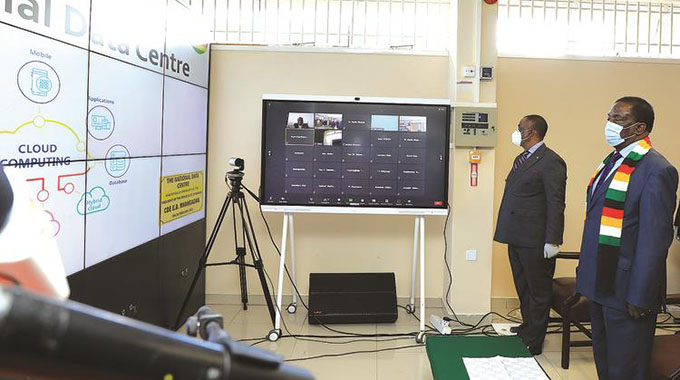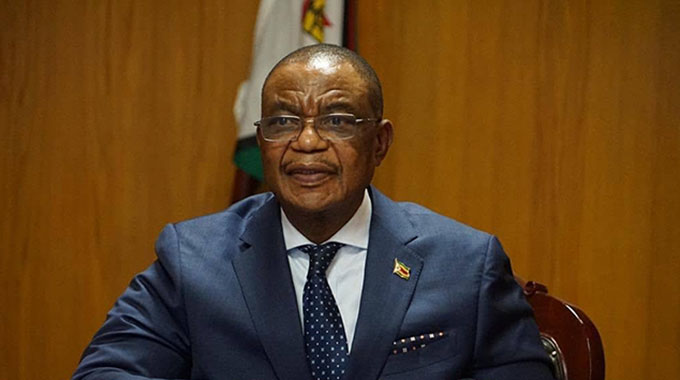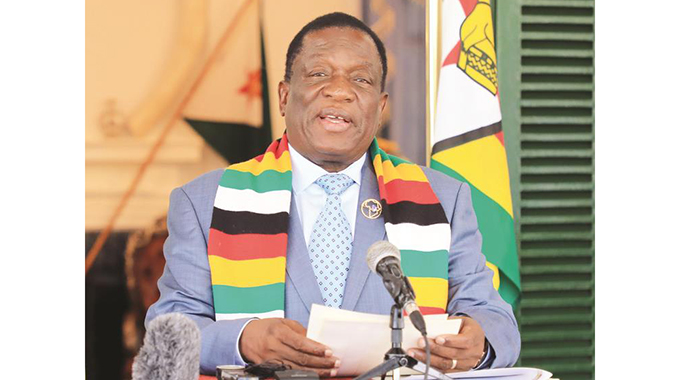Data centre game changer for digital economy

Zvamaida Murwira
Senior Reporter
The commissioning of the National Data Centre by President Mnangagwa on Wednesday is set to be a game changer in data management and will allow co-ordinated planning through the use of e-Government.
During the launch, head of the e-Government unit, Brigadier General (Retired) Charles Wekwete, outlined how the NDC will transform data use for the benefit of the Government and across the entire economy.
The NDC is meant to facilitate the e-Government processes through providing centralised virtual servers for data processing and storage accessible to all ministries and agencies across all Government departments.
“This removes the need for each department or ministry to have on its own premises the physical servers as is the current situation. It enables the shared use of ICT personnel instead of having database or network administrators scattered all over ministries and departments.”
He gave a number of examples where the NDC would bring efficiencies and save costs and time for the Government.
In vehicle management, Brig Gen Wekwete, said an officer could just enter the vehicle registration number and information such as whether one was paying vehicle licence Nyamandlovu, insurance, ZBC licences among others would be laid bare.
“In another scenario, the same principle will apply where data regarding vehicles through Central Vehicle Registry, data does not need to be stored at Zinara or VID or ZRP. All what the other ministries need is to get the vehicle registration number and verify the rest of the detail online without human intervention and if there is any anomaly you raise a red flag,” said Brig Gen Wekwete.
Brig Gen Wekwete said a police officer on foot or vehicle patrol with a mobile device linked to the NDC can just enter a vehicle registration number to establish whether it was stolen, whether the vehicles was insured, and if it is a public service vehicle then whether it had the required VID fitness certificate could also be ascertained.
The same officer could enter the driving licence number of the driver, and find out whether it was fake, or whether it was supposed to be endorsed and other details.
Computers on tollgates could also be linked to the NDC so as to ascertain whether a vehicle has paid all licences due such as for ZBC, Zinara licences or insurance or whether it was stolen or not.
“To do this, there might be need to change certain administration rules and laws because Zinara can say, for example, you have no roll on tollgate. We can have a tollgate linked to all other ministries, agencies that licence anything to do with vehicles. In that instance Zinara will have to link its system to all other agencies in a coordinated manner for tollgate computers to flag defaulters, instead of these different agencies mounting roadblocks along the same road looking for defaulters,” he said.
Using the tollgate to instantly and automatically do many of the checks done at roadblocks would cut inconvenience for the legal drivers and enhance finding stolen and unlicensed vehicles.
“In that scenario we can avoid a situation where with buses or kombis we will find out that it has no fitness certificate or insurance only when it has been involved in an accident yet it would have passed through a tollgate.”
Brig Gen Wekwete said when acquiring other documents such as passport or drivers licence you might just need to provide your identity number and all other details will emerge.
Speaking at the same occasion, Chief Secretary in the Office of the President and Cabinet Dr Misheck Sibanda said the launch of the NDC was a national anchor of e-government as well as a key component of National Development Strategy 1 and Vision 2030.
“While the contract of NDC was signed in 2014, financial constraints prevented its fulfilment until 2018 when the advent of the New Dispensation resulted in heightened prioritisation of this project and subsequent payment of outstanding amounts. Hence our being here today,” he said.
Public Service Commission chairperson, Dr Vincent Hungwe said data was critical in that it helped in decision making timeously.
“Time is the most valuable resource, clearly time can be spent once and any organisation must think strategically on how it need to spent time to achieve its goals,” he said.
Information Communication Technology, Postal and Courier Services Minister Dr Jenfan Muswere said his ministry will continue to provide the enabling environment that is necessary for the intensified adoption and utilisation of ICT within Government and across the economy at large to ensure that the country moved in tandem with global dictates.









Comments